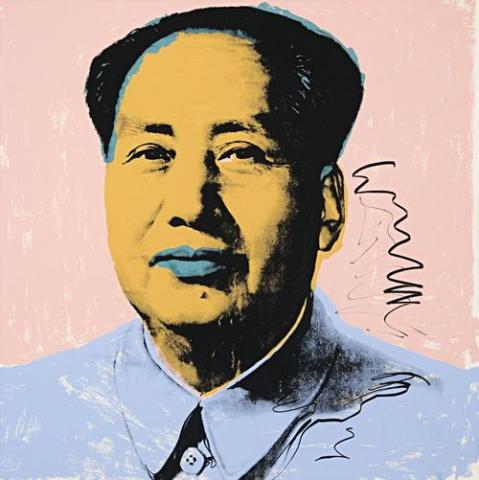MAO, 1972
Andy Warhol
colour screenprint
91.4 x 91.4 cm
signed and numbered with stamp verso Feldman and Schellmann, 1997, cat. II.92
Published by Castelli Graphics and Multiples, Inc., New York
Robert Sandelson Gallery, London (label attached verso)
Private collection, Sydney
Feldman, F., and Schellmann, J., Andy Warhol Prints: A Catalogue Raisonne 1962–1987, Ronald Feldman Fine Arts, New York, 1997, cat. II.92, p. 78 (illus.)
'No revolutionary artist can do any meaningful work unless he is closely linked with the masses, gives expression to their thoughts and feelings and serves them as a loyal spokesperson. Only by speaking for the masses can he educate them and only by being their pupil can he be their teacher.'1
Influential exponent of Pop Art and icon of the twentieth century art generally, Andy Warhol remains without doubt most universally acclaimed for his monumental duplicated images of mass-consumerism - from the ubiquitous Campbell's Soup Cans to his multiple 'heroic' portraits of celebrities such as Marilyn Monroe and Elvis Presley. Aspiring to an art 'for the people' as much as for aficionados, indeed his vision of the role of the artist bears striking similarity with that declared above by Mao Tse-tung (1893-1976), Chairman of the Chinese Communist Party, immortalised in the present suite of screeenprints. As Warhol muses, 'I don't think art should be only for the select few, I think it should be for the mass of American people- I'm not the High Priest of Pop Art, that is Popular Art, I'm just one of the workers in it.'2
Emulating official representations of the leader displayed widely throughout China during and after the Cultural Revolution (1966-76), significantly Mao constituted Warhol's first political portrait, successfully paving the way for a number of similarly oriented works including Lenin and Hammer and Sickle. Inextricably drawn to the subject as a result of the widespread media attention surrounding the reopening of China to the West, and particularly, President Nixon's historic visit of 1972, Warhol astutely sensed that this threatening and alien face of Communism would nevertheless bear an inevitable, perverse appeal to the capitalist collector. Indeed, in 1971, in his typically visionary manner, the artist unabashedly proclaimed - 'Since fashion is art now and Chinese is in fashion, I could make a lot of money.' Derived from the portrait of the Chinese leader on the cover of 'The Little Red Book', the present screenprints and series of ten life-size canvases reflect further this irreverent attitude towards China's totalitarian propaganda as Warhol depicts Mao wearing lipstick (and even eye-shadow in some versions) - wryly marrying the omnipotent image of this Communist god with the drag-queen decadence of Western mass-consumer culture. Thus, if by contributing to the proliferation of the dictator's image he seems initially to further the Communist agenda, at the same, Warhol powerfully undermines the very same regime by depicting Mao - the enemy of individualism - in such a flamboyantly personal style.
As Warhol's first new image for the decade, not only did Mao represent one of his most radical, but from a technical perspective as well, it heralded the most fundamental development of the artist's printmaking career. Previously, Warhol's conceptualisation of prints had not been directly related to his paintings with the prints usually produced several years later; with Mao however, both prints and paintings appeared within the same year. Moreover, from the present commission onwards, Warhol began to incorporate important stylistic devices into the silkscreen process such as collage, diamond dust, and the superimposed drawing evidenced here - thus culminating in the most conceptually and aesthetically sophisticated prints of his entire oeuvre.
1. Mao Tse-Tung, 'Talks at the Yenan Forum on Literature and Art' (May 1942) cited in Central Committee of the Communist Party of China, (ed.) Selected Readings from the Works of Mao Tse-Tung, Peking Foreign Language Press, 1967, pp. 219-220
2. Warhol cited in Goldsmith, K., (ed.) I'll Be Your Mirror: The Selected Andy Warhol Interviews, Carroll & Graf, New York, 2004, p. 90
VERONICA ANGELATOS
